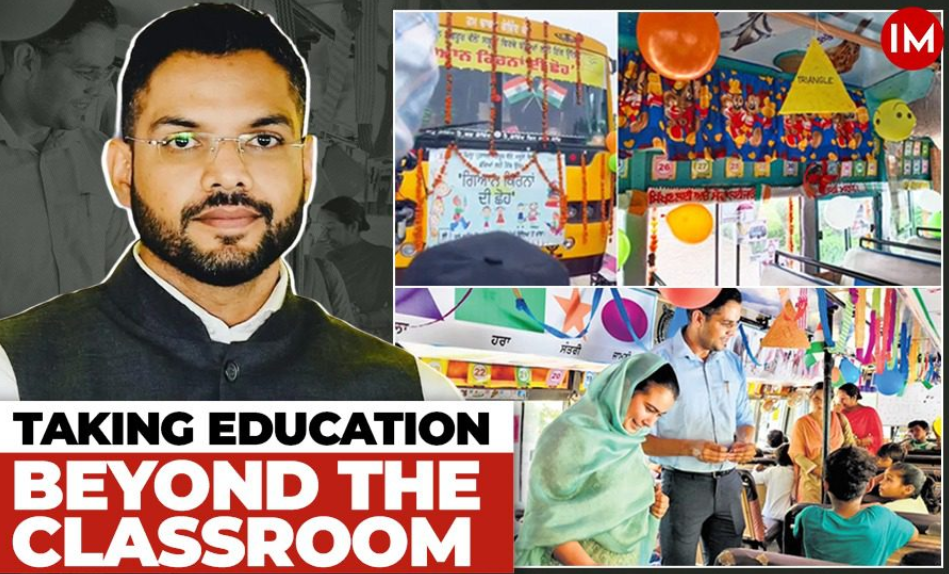Schools on Wheels is an innovative initiative by IAS officer Jitendra Jorwal that transforms yellow school buses into mobile classrooms, bringing interactive, hands-on learning experiences to underprivileged children in Sangrur’s slums—resulting in nearly 100% re-enrollment rates and rekindling their excitement for education.

In the bustling slums of Sangrur, Punjab, each morning begins with a sight that sparks hope. Two bright yellow school buses arrive, eagerly awaited by children who have never had a real taste of school life. For these children, the buses represent a gateway to learning, excitement, and a world beyond the narrow lanes they call home.
These buses, however, are no ordinary school buses. They are the heart of an innovative program called Schools on Wheels, launched by IAS officer Jitendra Jorwal to address the dropout crisis among underprivileged children. With every journey, these mobile classrooms bring education directly to the children — blending fun with learning, and showing them what lies beyond their neighborhoods.
BREAKING DROPOUTS’ CYCLE
When Jitendra Jorwal took charge as District Commissioner of Sangrur, he quickly noticed a troubling pattern. “Many children in the slums had either never enrolled in school or had dropped out,” Mr. Jorwal told Indian Masterminds . “We tried enrolling them, but they soon stopped attending again. It became clear that the traditional classroom setting wasn’t engaging enough for them.”
Working with anganwadi workers, child protection officers, and the education department, Jorwal set out to understand why so many children were slipping through the cracks. “It was disheartening,” he recalls. “Some of these kids were working as rag pickers or beggars. Their parents didn’t push them to go to school because every extra hand meant extra income.”
LEARNING BEYOND THE CLASSROOM
Jorwal realized that if he was to make a real difference, he needed to reimagine education itself. His solution? Turn education into a journey that these children would actually look forward to. “We needed to make learning fun and exciting — something that allowed them to see what they were reading about and learn from real-life projects,” he explains.
This vision gave birth to Schools on Wheels. Instead of sending children back to schools they didn’t want to attend, he decided to bring the classroom to them — on wheels. Each morning, the buses take these young learners to various educational sites, from rejuvenated ponds and seasonal farms to development projects and educational parks. Here, they experience learning in action, watching aquaculture practices, observing local farming techniques, and seeing firsthand the importance of environmental conservation.
“Each day, they learn something new,” says Jorwal. “The aim is to inspire a love for learning and encourage them to attend school regularly.”
CLASSROOM ON WHEELS
These mobile classrooms are designed to capture a child’s imagination. With colorful interiors illuminated by vibrant LEDs, the buses are equipped with books, interactive learning materials, and educational videos. Each bus has a teacher and two anganwadi workers on board, ready to guide and support the children on their learning journey.
“It’s not just about taking them to fun places,” Jorwal explains. “We wanted to give them an environment that would make them feel welcome and eager to learn. They look forward to getting on the bus each morning, and they’re learning in a stress-free, engaging way.”
The administration also provides essential supplies like school bags, hygiene kits, uniforms, toothbrushes, and tiffin bags. These small yet impactful gestures ensure that no child is left behind due to lack of resources.
A Lifelong Impact
Before the Schools on Wheels program, many of these children were technically enrolled under the Right to Education (RTE) Act, but their attendance was irregular at best. “The parents would say they send the kids to school, but they just didn’t go,” Jorwal says. “Some of these children were officially in the third grade but didn’t know the basics. We realized we needed a different approach.”
Attempts to bring teachers directly to the slums faced logistical challenges. “We tried asking teachers to hold classes near the children’s homes, but it wasn’t feasible, and teachers weren’t comfortable,” he recalls. That’s when the idea of a mobile classroom was born. With Schools on Wheels, the administration has created a space that not only provides education but also inspires curiosity and engagement.
A New Beginning in Ludhiana
The success of Schools on Wheels has been undeniable. Nearly 100% of the children who have participated in the program are now re-enrolled in school. Seeing the impact, Jorwal, a 2014 batch IAS officer, is now preparing to replicate the program in Ludhiana, where he currently serves as District Commissioner. “This program has shown us that when we make education accessible and engaging, children naturally want to learn,” he says. “I’m excited to bring this initiative to a new group of children and to make an even bigger impact.”
For IAS officer Jitendra Jorwal, Schools on Wheels is more than just an educational program; it’s a beacon of hope for the underprivileged children of Punjab, a chance to reconnect them with their dreams, and a reminder that no child should be denied the right to learn. Through these buses, he’s not just providing an education — he’s transforming lives, one journey at a time.
Article Credit: indianmasterminds